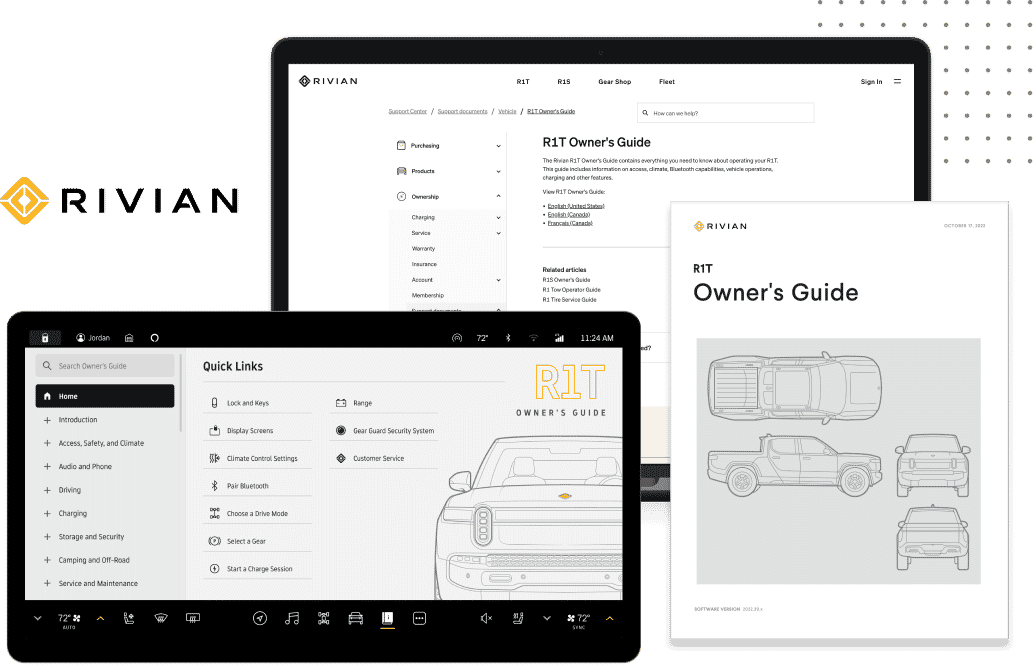This guest blog post was Leigh Hartzman, a content strategist for Waze at Google. Leigh is responsible for planning, creating and managing all of the documentation for the company’s customer service operation.
Do you remember the day you got the official notice that your office was closing its doors due to Covid-19? Think of all the new things you had to learn in the midst of the world’s largest work-from-home experiment just to maintain business as usual. Tasks that were once straightforward, like holding a team brainstorm session, or picking up a new charger for your laptop, required new skills, systems and processes. We needed new instructions on how to do just about everything.

The Learning Curve is Not Over
As business leaders announce the partial return to the office, we now have to adapt to a whole new set of complicated hybrid work and health standards. You need a standard operating procedure just to get through the office door!
Companies that weren’t convinced of the importance of documentation before the pandemic now realize how critical it is to success. With so much ambiguity in the world, the only way to forge a path through the unknown is to write it down. We call this internal knowledge—a centralized channel of crucial business information that employees can access to do their job whenever they need.
Demand for internal knowledge is booming, which is great news for technical writers. What’s more, the increased demand is changing the way we research, create and deliver internal knowledge, making it such an exciting area of technical writing to get into right now.
In this article, you’ll learn what is internal knowledge, how it makes a company successful and how to break into this technical writing niche.
What is Internal Knowledge?
Internal knowledge is the documentation of a company’s processes, which employees can use as a reference to get their work done. Although it’s never seen by customers, it’s one of the most important tools for any business.
That’s why companies hire technical writers to write internal documentation like:
- Onboarding training for new hires
- Standard operating procedures
- Internal wiki of company information
- Customer support workflows for support agents
- Operations playbooks
- Process documentation
For internal knowledge to be effective, it must be centralized, accessible and up-to-date. Companies will often use a knowledge base software with specialized authoring tools to assist with this.
The Benefits of Internal Knowledge
As a technical writer, it’s really satisfying to know that the documentation you are creating is helping your company be more efficient and grow. Our technical writing team at Waze writes internal knowledge and we love to see how our work improves organization, productivity and the bottom line. Below are just a few of the positive results we’ve experienced:
It Saves Time
You know that impromptu approach to work where every team member has their own method of doing things? Huge time waster. Multiple people work on the same tasks without realizing it, especially now that informal communication is at a minimum as we work remotely. In-person exchanges by the coffee machine were always the most informative.
When everyone does their own thing, the whole team fumbles to find information that’s “out there somewhere” and frustration soars. It’s no wonder that employees waste at least 5 hours a week waiting to hear back from people who have unique knowledge that they need. The wait time causes work to be delayed or even canceled.
Teams can get all that wasted time back with a comprehensive internal knowledge base. Everything employees need to know to do their job is documented and at their fingertips - policies, guidelines, procedures and cross-departmental information. No more waiting hours for an email response, interrupting co-workers for answers or accidentally duplicating efforts.
It Drives Growth
How does a successful baker bake enough delicious bread for the entire town? She has a killer dough recipe, but that’s not enough. She writes that recipe down, documenting every step of her dough-making process. Then, she hires 5 people and gives them a copy of the recipe. Now they bake delicious loaves of bread exactly how she does, turning her bakery into a household name.
Scaling a company is like baking more bread. Write down what works like a recipe, or what we call Standard Operating Procedures (SOPs), to replicate success with less effort. With formalized procedures on how to do things, a new business partner can quickly learn the ropes without having to sit through endless hours of one-on-one meetings with multiple people. Documentation ensures that everyone is working the same way, which maximizes resources and quality. Plus, it makes pinpointing areas that could be improved and gathering feedback simple.
So what are the consequences of not documenting company knowledge? Priceless information lives inside the minds of a small number of employees. They are the only ones who know how to scale the business and sustain growth. This is problematic at the best of times. What if they decide to leave or become uncooperative? Avoid this by documenting internal knowledge and turning it into a valuable company asset that any employee can access when they need it.
Skills You Need to Write Internal Knowledge
At the heart of writing internal knowledge is the ability to document processes. As an internal knowledge writer, you write more about business operations and less about the actual product offering. To do this, you need the ability to:
Define your audience: People read internal knowledge because they need to know how to do something as part of their job. The more you know about your audience, the easier it will be to write documentation that will help them achieve their goals. For example, a new hire may find your article on reimbursable business expenses, but if it’s written using acronyms that only seasoned employees are familiar with, they won’t understand it. Think about the type of employee you are writing for, their situation when they are reading your documentation and adapt your writing to their needs.
Do research: Locate materials, like briefs and specifications. You may have to gather these from several teammates. Speak to people to fill in the gaps if you are missing information. Gather as much information as you can about possible difficulties an employee may face and cover them in your documentation to make it as helpful and supportive as possible.
Create an outline: Take all the complex information you gathered and break it down into digestible chunks. This will help you get organized and recognize parts of the process that need more information. You may even realize that the process needs to be broken down into several articles.
Write: Fill in your outline with clear and precise instructions that take your reader from where they are to where they want to be. Identify essential information from the non-essential information, lead with the most important information and organize actions in chronological order.
Edit: Internal knowledge should be concise. Strip out extra details that the reader doesn’t need to know to successfully do the thing. Stick to actionable steps, preferably one action per sentence. Keep your sentences short, and try to replace long words with shorter ones.
Test: There’s only one way to know if you wrote good documentation - if it actually works. Follow your own instructions to see if they lead you to success. Then, ask a few members of your target audience to do the same and ask for feedback. Use a feedback tool or process to gather input from your audience, which you can use to improve your documentation over time.
How to Find Jobs in Internal Knowledge
Companies have different ways of describing the role of an internal knowledge writer. Sometimes they know what they are looking for and publish the job opportunity as:
- Internal knowledge manager
- Internal knowledge base writer
- Learning & development manager
- Procedure writer
- Documentation specialist
Sometimes companies don’t exactly know how to define the role so they call it:
- Knowledge developer
- Process writer or manager
- Training creator
- Technical writer
- Content writer
Make sure to search for all these terms when looking for internal knowledge job postings online.
Does a Career in Internal Knowledge Sound Right for You?
If you were thinking about getting into the field of internal knowledge, this article should have convinced you that there’s no better time than now to get started. Learn about technical writing as a career and start improving your skills with my technical writing handbook.










